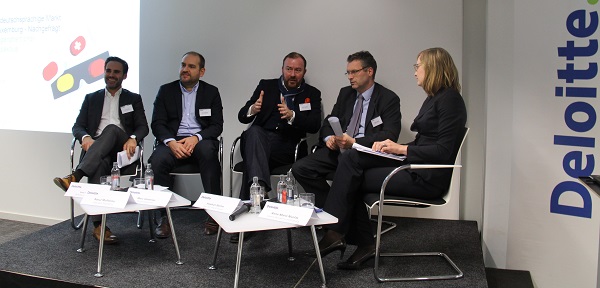
How digitisation is changing the market, business, and work processes, which areas financial service providers are particularly active in, and the role corporate governance play in an increasingly digitised business world, were three of the topics covered at a conference hosted by Deloitte Luxembourg on Wednesday; there was also a presentation of the new edition of Deloitte’s market study entitled “The German-speaking market in Luxembourg – an in-depth analysis”.
Around 70 people had gathered to engage in the discussions and listen to the panel which consisted of Anne-Marie Nicolas from the law firm Loyens&Loeff, Stephan Blohm from von der Heydt Invest, Raoul Mulheims the managing director of Digicash Payments, and Luc Brucher, Partner at Deloitte Luxembourg.
For this third such Deloitte Luxembourg conference, the main focus centred on the current market trends and good corporate governance in companies as well as opportunities and risks of growing digitisation.
The panel discussed the following:
Digitisation: is Luxemburg well positioned?
Luxembourg’s ICT sector ranks among the top 10 globally. An ultra-modern infrastructure with the world’s greatest concentration of data centres, corresponding regulatory requirements, and specialist skills provide optimum conditions for business developments in the information and communication technology sector. In the financial sphere in particular, where the current buzzword is Fintech, the Grand Duchy is at the forefront.
“Luxembourg is creating new services at the intersection between technology and finance, which also have great development potential beyond the domestic market. This also includes, among other things, mobile payment services for banks and peer-to-peer payment systems,” explained Jan van Delden, Partner and German business leader at Deloitte Luxembourg.
Development potential still exists in terms of data protection guidelines and promotion of young talent in the ICT sector. The panellists agreed that well-trained IT specialists are not always easy to find in a small country like Luxembourg. Furthermore, companies should increasingly prepare themselves for the customer’s need to approach them via several digital channels in order to, for instance, discuss the benefits or disadvantages of products.
Good Governance
As Europe’s largest fund centre, and the second largest in the world, the Luxembourg market place is also faced with increasing requirements for supervisory activities and demands on quality and transparency. Good corporate governance guidelines in companies can contribute to a more efficient and transparent use of resources. According to Stephan Blohm, managing director of von der Heydt Invest, one such guideline features functioning internal control systems, proper risk management and compliance, and internal revision. “These three pillars of controls have the task of supporting management and ruling out fraud and erroneous actions via stringent audits and monitoring,” explains Blohm. “The current corporate governance standard in Luxembourg leads the way in comparison with other countries and prompts investors to choose Luxembourg as a hub for the management of their investments.”
The ALFI Code of Conduct for Luxembourg Investment Funds and the Ten Principles of Corporate Governance of the Luxembourg Stock Exchange are just two examples of the key focus on higher quality standards in the field of governance in addition to legal and regulatory requirements.
The complete study “The German-speaking market in Luxembourg, an in-depth analysis” including interviews with representatives from the worlds of politics and business, plus a video summary on the topic of digitisation can be found here.
Photo provided by Dachser








